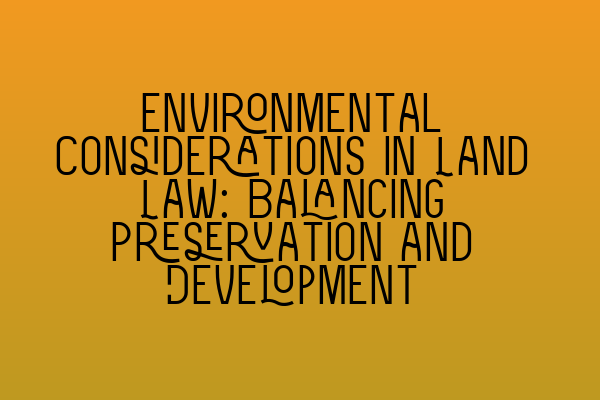Environmental Considerations in Land Law: Balancing Preservation and Development
Introduction:
In the world of property law, environmental considerations are playing an increasingly crucial role. As society becomes more aware of the impact of human activities on the environment, it is necessary for solicitors and property developers to strike a balance between development and preservation. This blog post will explore the significance of environmental considerations in land law and discuss the challenges faced in balancing preservation and development.
1. Understanding Environmental Considerations:
Environmental considerations refer to the evaluation of the potential impact of human activities on the environment. These considerations encompass a wide range of factors, including but not limited to air and water pollution, habitat destruction, noise pollution, and the preservation of natural resources. In land law, it is vital to take into account the environmental impact that a proposed development or use of land may have.
2. Legal Framework for Environmental Considerations:
In the United Kingdom, there exists a comprehensive legal framework to regulate environmental considerations in land law. The primary legislation governing environmental protection is the Environmental Protection Act 1990. Additionally, there are various regulations, such as the Town and Country Planning (Environmental Impact Assessment) Regulations 2017, which require an assessment of the environmental impact of certain projects before they can be approved.
3. Balancing Preservation and Development:
One of the key challenges in land law is finding a balance between preservation and development. On one hand, there is a need for economic growth, urban development, and the creation of new infrastructure. On the other hand, it is essential to protect the environment, preserve natural habitats, and ensure sustainable use of resources. Striking this balance is a complex task that requires careful consideration and expert advice.
4. Environmental Impact Assessments:
One tool that helps in achieving a balance between preservation and development is the Environmental Impact Assessment (EIA). An EIA is a process by which the potential environmental effects of a proposed development are identified and evaluated. It provides an opportunity for stakeholders to understand the potential impact on the environment and suggest measures to mitigate any adverse effects. An EIA is a vital step in the decision-making process and is required for specific projects, as mandated by the relevant legislation.
5. Role of Solicitors in Environmental Considerations:
Solicitors play a crucial role in navigating the complexities of environmental considerations in land law. Their role involves advising clients on the legal requirements relating to environmental impact assessments, assisting in the preparation of these assessments, and ensuring compliance with environmental regulations. Solicitors also guide clients in negotiating agreements with relevant authorities and stakeholders to minimize any potential negative environmental impact.
6. Importance of Expert Advice:
Given the intricate nature of environmental considerations in land law, seeking expert advice is essential for both solicitors and property developers. Environmental consultants and experts provide valuable insights into the potential impact of a proposed development and offer guidance on measures to protect the environment. Their expertise ensures that the development process complies with environmental regulations and minimizes harm to the environment.
Conclusion:
The balancing act between preservation and development is a continuous challenge in land law. Environmental considerations have become increasingly significant, with a growing emphasis on sustainable practices and environmental protection. Solicitors and property developers must be mindful of the environmental impact of their actions and work towards achieving a balance that allows for economic growth while preserving the environment. Seeking expert advice and complying with existing legal frameworks is crucial in successfully navigating environmental considerations in land law.
Related Articles:
– SQE 1 Practice Exam Questions
– SQE 1 Practice Mocks FLK1 FLK2
– SQE 2 Preparation Courses
– SQE 1 Preparation Courses
– SRA SQE Exam Dates
